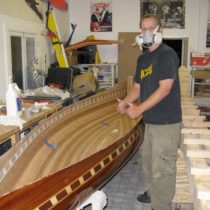Landscape Architecture for Landscape Architects › Forums › SUSTAINABILITY & DESIGN › Is the future really “green”?
- This topic has 1 reply, 12 voices, and was last updated 13 years, 6 months ago by
 Thomas J. Johnson.
Thomas J. Johnson.
-
AuthorPosts
-
October 7, 2010 at 2:40 pm #167470
 Trace OneParticipant
Trace OneParticipantThe clean air act was not signed at swordpoint, nor was Brown v. board signed under duress..I ho pe it is possible for us to act rather than react..Although the progress on climate change legislation seems to support your point, or even worse – we don’t even act when the waters are swirling around our heads, but just go under..slowly..The frog in the boiling pot..
October 7, 2010 at 2:41 pm #167469 Noah MabryParticipant
Noah MabryParticipantWell I didn’t exactly delve into that so much because I’m at work (not doing LA by the way). But the point of the article I believe is that because of things like oil subsidies the real price of energy is hidden. If the taxes and increased insurance premiums were passed directly through the gas pump rather than spread out in ways that are not directly observable to regular people then drivers would change their habits.
And how does this affect us? Once people can’t afford to drive everywhere demand for better designed communities not focused on automobiles would explode.
October 7, 2010 at 3:07 pm #167468 Ben YahrParticipant
Ben YahrParticipantIf it happened quickly, it would affect us by collapsing out entire way of life. If gas were truly $15 (1998 dollars as the article poses as a high guess), commerce would screech to a halt. There would be demand for better designed communities, but there would be no funding to build them.
That’s why it’s important to find alternatives to an oil infused lifestyle now, while there is still at least a little funding available. Even the invisible hand of the market wouldn’t be effective if there was a sudden and prolonged increase in oil prices, because there would be limited funding available for R&D.
October 7, 2010 at 3:32 pm #167467 Trace OneParticipant
Trace OneParticipantkiller article, Ben! thanks for posting that!
October 7, 2010 at 4:14 pm #167466 Noah MabryParticipant
Noah MabryParticipantI think you’re absolutely right Ben, except that we probably wouldn’t have to worry about economic collapse as the armed insurrection at instantly exorbinant gas prices would most likely be the main concern.
Just the slight increase in gas prices to over $4/gal a few years ago led to more public transit ridership in many places (including here in Columbus, OH). It wouldn’t take much to start to nudge people. And that’s when demand for different types of cities, towns and neighborhoods would start to pick up.
If we did do anything a slow even transition would be ideal, but I just don’t see that happening. Unless we really get out in front of it to some extent it’s probably going to happen when gas prices spike again, or we just start running out of oil. I really hope we wake up soon or it’s not going to be pretty, but I am a huge proponant of doing all the R&D we can while there’s still time!
October 7, 2010 at 5:09 pm #167465 Ben YahrParticipant
Ben YahrParticipantThe underlying point here (in case it wasn’t obvious) is that the subsidies and economic drivers of the “green economy” are a tiny drop in the bucket compared to the factors that are propping up the traditional economy.
Take high speed rail as an example. If the teabaggers don’t block it, as much as $8,000,000,000 could be spent upgrading and establishing a long term option for intercity travel in the near future. Compare this to the $1,890,000,000,000 spent on air and highway infrastructure between 1971 and 2001. (These are federal funds, not including local and state funds applied to roads, parking lots, etc. etc- billions vs trillions.)
Furthermore, I question the extent to which regulation has really stifled growth. It is still possible to build a Walmart in a wetland, you just have do jump through more hoops.
“Enabling” the the green economy and the weak regulations that are in place are not really changing anything in the big picture- though meager progress is better than regression.
October 7, 2010 at 5:10 pm #167464Chupacabra
ParticipantThere’s plenty of negative externalities associated with “green” energy. All these large scale, highly subsidized solar and wind projects have massive footprints. We’re talking potentially millions of acres of previously unmodified habitat disturbed, much of it in fragile desert areas, and much of it presently used to connect species to protected natural areas (Mojave NP, Joshua Tree NP, etc.). “Green” energy might be able to continue on the rates and breadth of land consumption that sprawl started.
There is also the issue of the impacts to viewsheds. As it is now solar and wind farms are rare enough that it is a novelty when you see them. Imagine if all of your long distance trips were lined with solar fields and turbines because that’s the amount of “green” energy development that is being proposed. Sure, it’s just scenery, but it is part our the US’s heritage.
And then there is the fact that all of this “green” energy is dependent upon massive amounts of rare earth elements. If you know anything about REEs then you know obtaining them is anything but green, and right now the Chinese pretty much control this market.
October 10, 2010 at 1:16 pm #167463 Andrew Garulay, RLAParticipant
Andrew Garulay, RLAParticipantMy point is not that we should stop alternative energy and that oil is all well and good.
It is simply that there is not a lot of coat tails that will pick up the economy from these projects when they do occur, especially for landscape architecture. I’ve worked on a few wind turbine projects. They have a small footprint on the ground as far as design on the land goes – it takes longer to fill out the FAA application than to draw the plan because there is nothing to it and won’t go beyond a civil/survey office because of that.
Is it expected that after needing to already contract land surveyors and civil engineers for work on solar farms that there would be reason to hire a landscape architect after that?
I’ve had two brushes with projects that went for LEED recognition. One was for a high profile non-profit environmental dot org and the other an achitect doing a small home for himself. Both did it for marketing reasons. It seems that the only people going through that process are those hoping to benefit by the image. It is not the broader market.
There seems to be a bigger interest and movement of money from design professionals to the people controlling the environmental message than is moving from the market to the design professionals because of their investment in the image.
Changes, whether they are possitve or negative, real or perceived, create situations that can be exploited. We can’t overlook that we as a profession or group of people are a target market. In desperate times people will take desperate actions. This is an opportunity for others who are also looking for income. Look at the amount of posts from people who have no job taking out loans to get a MLA or scraping up as much as they can to get LEED certified thinking that it will change everything. Then look at what work is actually out there and ask yourself if it adds up. Some people are getting played, although there are some that will benefit.
Current projects are much more nuts and bolts than fluff and frosting, yet the people coming into our profession run from that identity and want to be identified as something that the existing market is avoiding.
It makes no sense. Collecting letters after your name that few people understand and loan debts to join a growing mass offering services that few currently want is not a way to invigorate the profession or the economy.
The market WAS moving in the green direction. It WAS important to fill that market. It IS important to adjust to what is out there now and what is going to be out there in the next few years. How can anyone expect that it will not be a back to basics market?
I’ve been in meetings where the idea of having an LA get involved was instantly dismissed because “they’ll blow up the cost and turn it into an environmental project” (I’m in a CE office and they did not know my profession). That is not helpful.
Having the capability is necessary, being pigeon holed as a profession is disasterous.
October 11, 2010 at 2:21 am #167462 BoilerplaterParticipant
BoilerplaterParticipantAuthor Douglas Coupland’s take on the future: http://www.theglobeandmail.com/news/national/a-radical-pessimists-guide-to-the-next-10-years/article1750609/singlepage/#articlecontent
Note #9 on what will become of “E.T.style” California suburbs.October 11, 2010 at 2:02 pm #167461 Andrew Garulay, RLAParticipant
Andrew Garulay, RLAParticipantAuthor’s views of the future are all interesting, but we have hundreds, if not thousands of people in Land8Lounge alone that are making decision and commitments that will shape their lives. Many are takiing on debt to ensure a better future while adding a lot of burden to it at the same time. Only ideas certain theoretical ideas of where the economy, living conditions, seem to get discussed.
1.) There will be no middle class – If this is so, don’t invest in an education and get yourself in debt unless you are in a situation that makes it very clear to you that you are in the upper class.
2.) There will be no suburban lifestyle – move into your high end city housing if you are in the upper class or sign up for affordable housing in the city or head for the boondocks to start your subsistence farming if you are in the lower class. …or join a gang that will hang out in the abandoned homes of the former suburbs.
3.) Spend your day bitching about others outsourcing jobs to Asia while you look into LA jobs in China and Dubai.
4.) Get onto your local conservation commission or planning board and try to kill as much development as possible to keep greedy people from making money and then network with those developers to get more design work.
5.) Support high density in order to minimize spaces between buildings and make sure architects know that you own the spaces between buildings.
6.) Eliminate parking lots and put up bike racks.
Some of these things may be true in the future, but most of our lives are not going to make it all the way across that bridge to the future should it actually become realized. The alternative is to look at the world around you and see what is right now and what is in the nearer future so that you make the best of the current times that we are in.) I just watched a Mad Max movie and know that I need some leathers, a sawed off shotgun, some motorcycle riding lessons, and some siphoning gear to make for a prosperous post apocalyptic future.)
Either that or I’m going to be working on one of the three suburban landscape design plans than I’m contracted to do in my part time office. On Tuesday its back to my full time job to finish off either the car dealership addition (with additional green space and rain gardens), the mitigation plan for the carriage house adjacent to a Coastal Bank, the pier in the tidal river, the house on the non-significant dune, the eye doctor’s office expansion, a four lot subdivision, a 5,000 SF land swap to increase zoning setback to allow for a swimming pool, the raze & replace of a house between a feshwater wetland and a Salt Marsh, a twenty two lot open space subdivision with bioretention areas and an advanced denitrification sewer system, gas station raze & replace,….. Work is out there, but it is not all glamorous. These are all truly in the process going through my desk.
You have to prepare yourself to do what IS out there. It is not going to adapt to your needs. Many of these projects will require some green solutions in terms of septic, drainage, plant selection, and mitigation. Septic is out of the realm of LA work, but the rest fall within it. Most of it is very basic and does not require advanced training or certification. I’ve said many times that most of us are putting environmental principles into every project. Most times these are common sense practical solutions while other times they are mandated by regulation. BUT, it is extremely rare that these are the projects themselves. Waving a big banner screaming to the world that you are Green leaves the impression that you don’t value the central issues of projects like the ones that I listed above. If you are trying to build on a dune are you going to call someone who is more worried about the dune than your house? Are you going to call someone who is more worried about creating more green space out of your auto dealership parking lot than getting the addition approved? Are you going to call someone that will site your carriage house so that you can get your car in and out of it with relative ease (with mitigation), or someone that would compromise the function to preserve the existing buffer? You are hired on how you are perceived to be able to get the job done relative to others who can get the job done. Know your “green”, but don’t expect more froom it than the market is going to give you.
The future is not here yet and no one knows exactly what the future holds. You have to survive today to make it to the future. Enjoy today while you have it. Don’t forget that thirty or forty years ago everyone thought cars would be displaced by flying machines and we’d be eating pills for food. Seldom is the predicted future realized. I’m glad that I did not take out a loan to learn to pilot a flying car.
October 11, 2010 at 2:06 pm #167460 Steve MercerParticipant
Steve MercerParticipantSeriously? What rock did you crawl out from under? This economy runs on energy. When Oil prices goes sky high the economy is headed for the toilet. That’s a fact Jack! When the economy is already struggling you would have us fall on our sword by raising the price of Oil huh? It is true that the supply of cheap oil is not what it use to be. As the economics change so will we. The human spirit is highly adaptable. These changes will not happen overnight. The migration away from oil will be a long good bye. I chuckle at consumers who have bought the “green” ” sustainable” marketing hype ( and that is what it is HYPE) We also operate a Greenhouse operation. And the cost of the green pots such as the Jiffy peat pots are double to triple the price of the plastic pots. The Green labels used on those peat pots are more expensive (of course) and even though they are compostable… if you read the fine print they are only compostable at a commercial compost site (which there are only about 100 sites around the whole US.) So the consumer is going to pay to ship those labels to one of these sites? NOT! They go in the trash with everything else. It raises the cost of the plants though and I guess for the die hard green enthusists… it makes them fell better. Actually the labels contaminate the recyclable waste plastic stream and render the recyclable plastic useless. This I would say goes so far as to join the other side. But hey the consumers feel better right?
People talk green and sustainable, It seems to be close to the top of some peoples list. Since we are in an energy intensive business we switched to alternative energy to heat our Greenhouses years ago before green was cool. (after you get your monthly gas bill and it is $10,0000.00 you become highly motivated not to write a second months check of the same amount) I will say though it has not been easy. When we first started it was illegal to burn waste wood in our state without a “Waste Energy Facility Permit” the same permit a landfill is required to obtain to operate a incinerator) The permits are so difficult to obtain that since the early 70’s when the law was enacted you can count the number of permits granted in our state on one hand! This is another example that Government regulation is not the answer it IS the problem! I would hope that the FED would come to it senses about LEED. LEED should be implemented on a project because it makes economic sense. If it fails that test then it is just another add on cost that potentially makes the project non viable. I guess less projects could be considered a green strategy too!
October 11, 2010 at 2:35 pm #167459 Steve MercerParticipant
Steve MercerParticipantCareful what you site… I live in Louisville where Brown vs. Board of Education occurred and I can tell you that public education has suffered terribly as a result of that decision. Anyone who can afford it either has moved out of Louisville or is in private school because getting a good education through the public school system is impossible. I will give you a perfect example. When my son was finished with the fourth grade the School system was ready to pass him to the 5th grade even though he had been tested in math and reading on a second grade level. (“Holding him back would be to devastating to his self-esteem” ) They weren’t to concerned about that for the 2 years that he was falling behind! This School season the Board of Education changed it’s student assignment plan. And the first day was a Disaster kindergarten and first graders dropped off at wrong locations sometimes miles away from their homes. Some kids were as much as 3 hours late getting home. Do you really think the mother of a 4 or 5 year old child (regardless of race) is enthusiastic about sending their child on a one way bus ride that is 45 mins to an hour twice a day? What if the child gets sick or injured? You the parent have a 45 min drive to reach your child? All in the name of racial equality? How sustainable is that? I recognize that there was a problem. Surely there is a better way to deal with this issue. I personally believe that though the schools are more racially integrated now (as mandated by Brown vs Board of Education) the primary function of schools namely education has suffered greatly! And I am not impressed!
October 11, 2010 at 2:58 pm #167458 Steve MercerParticipant
Steve MercerParticipantThe Fertilizer runoff in the Gulf is a result of our current Agriculture Policy which started with Earl Butz in the Nixon Administration. Before that time animals and the forage and the feed required to raise them was all produced on the same farm. Today the forage is rasied on one farm the feed is raised on another and the animals on a different farm and all these activities are supported by shipping these ingredients from farm to farm. Great for the transportation industry but not very efficient. I have a relative in southern Ill. who owns about 3,500 acres and has grain farmed there his entire adult life. Within the last 2 years they have quit because they can no longer make it on 3,500 acres. As long as the Fed maintains our current Agricultural Economic policy the Farmers are on a treadmill that is constantly increasing in speed and more and more farmers are falling off of it… never to return!
As far as the extinction of species are concerned this is as much a part of nature as the rain. A species has always been here only as long as they could adapt. Those who can’t are extinct. That is rule no. 1 in Nature! Man or No Man!
October 11, 2010 at 3:39 pm #167457 Rob HalpernParticipant
Rob HalpernParticipantSteve,
Your comment about extinction blithely brushes away how human activity has accelerated the extinction rate enormously. It is rather like saying, “Hey, things have been burning down for millenia, whether an arsonist set the fire or not.”
October 11, 2010 at 4:31 pm #167456 Steve MercerParticipant
Steve MercerParticipantWell yes humans do have an effect, however in order to have a fire you first have to have adaqute fuel and dry weather conditions… does it really matter that man or lightning started the fire? Or is fire a natural result of to much fuel?
-
AuthorPosts
- You must be logged in to reply to this topic.

